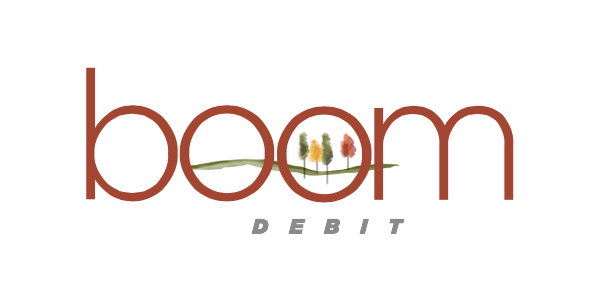Region of boom: Heritage Grove’s unique, homegrown, reloadable debit card aims to attract area millennials

By listening to its younger members, Heritage Grove FCU created an in-house, reloadable debit card product free of fees and paper that sets the stage for its future.
With Apple Pay seemingly making headlines every minute with its breakthrough payments solution, there’s one credit union making waves of its own with a unique, homegrown, payments product. Heritage Grove Federal Credit Union has created a no-nonsense, no-strings attached, reloadable debit card to make purchases for today’s members who don’t desire a checking account. They call it boom, which is how easily members can make purchases and manage their accounts – all online, with no paper checks, no paper statements, and no paper period.
Heritage Grove’s boom account, meant for those members who think checkbooks are synonymous with the Model T, cotton gin, and 8-track cassette players, leverages today’s mobile and online financial services with free mobile and Internet banking – along with eStatements, remote and direct deposit, and access to more than 50,000 ATMs. Again, unlike most other FIs, the credit union’s reloadable boom debit card services are free. Best of all, this product was created, developed, and deployed by the $100 million credit union.
According to Heritage Grove CEO Jim Mau, the idea for boom debit originated during a checking product review. Mau and his team researched competitor products and completed an exercise in Product Attribute Mapping.
“We mapped the positive and negative attributes of our current product offerings as well as some of the more prominent bank and credit union competitors in our market,” he explains. “The idea being to create new value by adding positive discriminators like free features that other competitors charge for – while removing negative attributes like overdraft fees.”
After several iterations and prototypes, Mau and his team determined that a debit card with no overdraft fees, no direct deposit requirement, no paper checks, and no paper statements would provide the credit union with the best market differentiation. And so boom was launched in July 2014.
“We are the only credit union in our market-space that I am aware of with this type of product,” he says. “One local credit union executive recently told me that he believes plastic cards are destined for extinction. I agree that overall plastic use will begin to decline eventually with the rise of mobile payments, just like paper checks have with the rise of debit cards.”
Mau believes, however, that plastic cards will be useful for at least the next five to 10 years. This window provides the credit union with ample time to recover its modest research and development expenditures.
Most large national banks – and even non-traditional competitors like Walmart – offer reloadable debit cards. The services offered, fees charged, and restrictions vary greatly with those organizations, however. For example, most competitor debit cards require a direct deposit to avoid a monthly service charge.
In Salem, Oregon, where Heritage Grove is located, it has many small employers that do not offer direct deposit. By removing the requirement for direct deposit, the credit union has created an opportunity to connect with a valuable source of potential members: local retailers and their customers.
“Instead of forcing options via fees, we have opted to emphasize the positive attributes of boom debit that includes free mobile banking with mobile deposit and bill pay,” Mau says. “By requiring e-statements, we lower our per account costs and focus our offering on people who are willing to receive their statements and other account communications electronically through our internet banking platform.”
Mau adds that if his credit union connects the right people with this product, he believes that the vast majority will choose to utilize its most convenient and lowest cost channels to fund their accounts and perform transactions.
“We chose to create boom as a debit account instead of a ‘checking account’ in part because many younger members no longer requested checks,” he admits. “We also picked up on the fact that the primary payment tool, the debit card, is what people wanted not a checkbook.”
By not offering checks with this account, the credit union has eliminated the opportunity to bounce checks and made the chance of accidentally drawing the account negative very rare. Complimentary mobile and internet bill pay further reduces the need for paper checks. If needed boom debit holders can purchase money orders and cashier’s checks at the credit union’s standard fees. Other unique features include boom debit’s vertical card orientation that aligns with Heritage Grove’s “Stand Tall” philosophy:
Heritage Grove partnered with Raoust + Partners marketing firm to help develop and promote its debit card product, which crafted and created the name “boom” to leverage the popular vernacular expression of great and amazing that’s common with a younger demographic. It’s also a double entendre to communicate to members that they, too, are empowered to “stand tall.” Lastly, boom is also a name that refers to the cluster of logs that float down rivers, ubiquitous to Oregon’s logging heritage.
“boom is unique in the sense that how many $100 million credit unions out there have actually created, branded, and deployed their own reloadable card? The answer is exactly none,” states Raoust + Partners’ President Olivier Raoust. “As previously stated, boom is also a very competitive product targeting folks who simply do not want a traditional checking account relationship – which is becoming more and more common today.”
Mau adds that boom’s primary goal is to connect with a much greater number of potential and younger members increasing total debit account penetration and interchange income. Heritage Grove’s boom debit provides for a low-priced, entry-level product that allows the credit union to deliver immediate value and build relationships over time.
“Items such as eStatements not only lower our cost over traditional statements, but they provide for regular electronic credit union messaging including financial education opportunities,” he says. “Our boom product allows Heritage Grove to compete with the large national banks and retailers in a space that we know that we can deliver a superior value along with our Stand Tall service.”
Since July, Heritage Grove has added 99 boom accounts (as of October 31), increasing its total payment account penetration (checking and debit) year-to-date by more than 3%.
The credit union had a goal to reach 100 boom debit accounts by yearend without cannibalizing its existing payment accounts. “We will greatly exceed this initial goal and have continued to grow our traditional checking account options,” Mau says. “With adjustments to our marketing and business development strategies we are forecasting continued payments account growth in 2015.”
Much to the credit union’s surprise many Heritage Grove member segments have found value with boom debit. Originally thinking the card would primarily appeal to young members because those were the folks who were declining checkbooks when opening our traditional checking accounts, Mau and his team quickly discovered that members of all ages enjoy the value and convenience that boom debit provides.
“Overall, the results we are really looking for will be measured over time as we work to deepen the relationships with our boom debit members,” Mau adds. “By connecting members with the immediate value of our free boom debit card, we are able to begin communicating about our other offerings, such as financial education, first time auto loans, home loans, and more. This springboard boom provides will help build a solid foundation of long-term member relationships for a very bright future that will benefit both parties.”

